MP0539 - Assessing the Media's Watchdog Role in Modern Democracies
VerifiedAdded on 2023/04/20
|14
|4169
|144
Essay
AI Summary
This essay examines the crucial role of the media as a watchdog in modern democracies, evaluating its successes and failures in holding power accountable. It begins by defining the watchdog role, emphasizing the media's responsibility to monitor government actions and promote transparency. The essay highlights instances where the media has been instrumental in uncovering scandals, such as the Watergate scandal, demonstrating its power to bring injustices to light. However, it also addresses the failures of the media, including government interference, priming, and framing, which can compromise its credibility and effectiveness. The analysis considers the impact of technology, cultural diversity, and media ownership on the media's ability to fulfill its watchdog function, ultimately providing a balanced perspective on the media's role in safeguarding democracy.
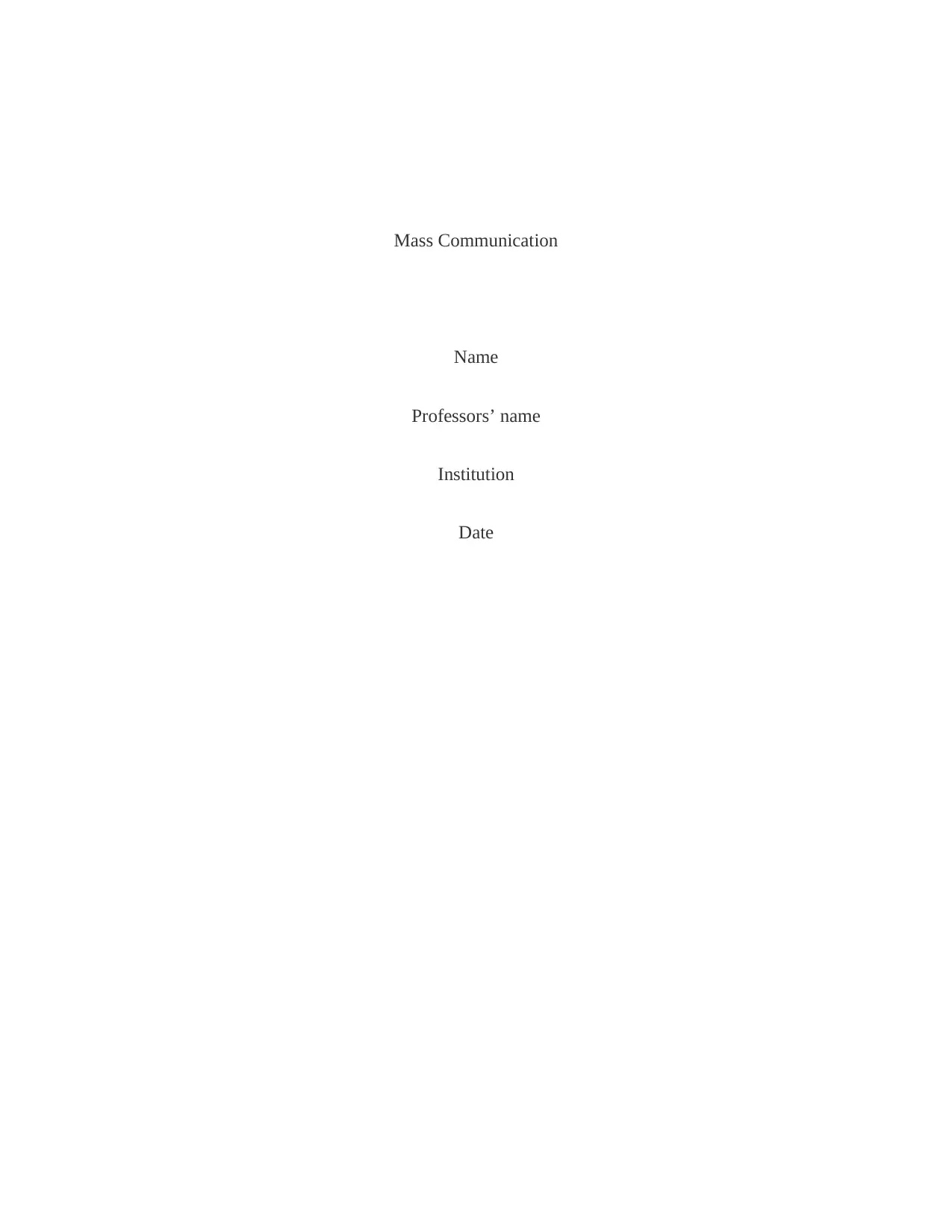
Mass Communication
Name
Professors’ name
Institution
Date
Name
Professors’ name
Institution
Date
Paraphrase This Document
Need a fresh take? Get an instant paraphrase of this document with our AI Paraphraser
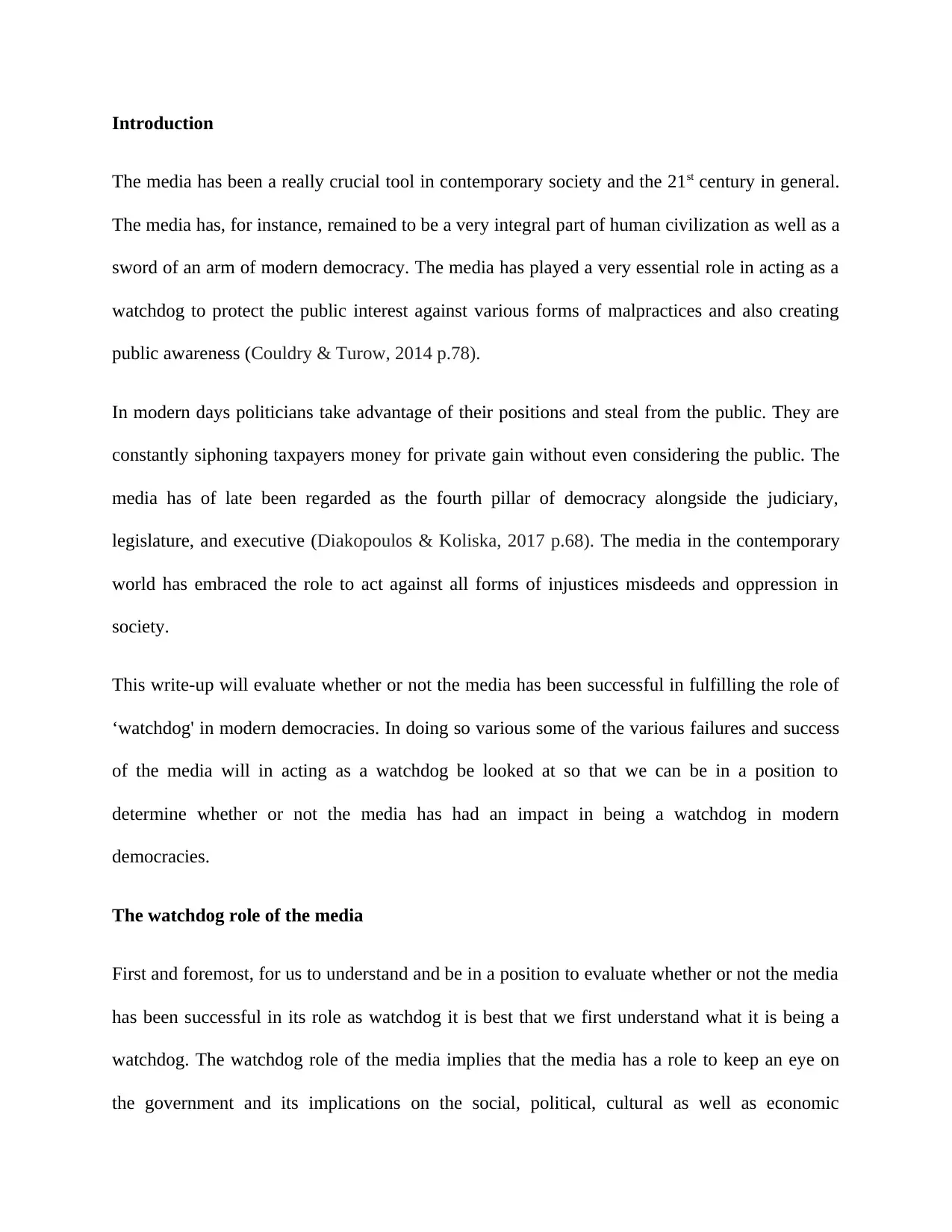
Introduction
The media has been a really crucial tool in contemporary society and the 21st century in general.
The media has, for instance, remained to be a very integral part of human civilization as well as a
sword of an arm of modern democracy. The media has played a very essential role in acting as a
watchdog to protect the public interest against various forms of malpractices and also creating
public awareness (Couldry & Turow, 2014 p.78).
In modern days politicians take advantage of their positions and steal from the public. They are
constantly siphoning taxpayers money for private gain without even considering the public. The
media has of late been regarded as the fourth pillar of democracy alongside the judiciary,
legislature, and executive (Diakopoulos & Koliska, 2017 p.68). The media in the contemporary
world has embraced the role to act against all forms of injustices misdeeds and oppression in
society.
This write-up will evaluate whether or not the media has been successful in fulfilling the role of
‘watchdog' in modern democracies. In doing so various some of the various failures and success
of the media will in acting as a watchdog be looked at so that we can be in a position to
determine whether or not the media has had an impact in being a watchdog in modern
democracies.
The watchdog role of the media
First and foremost, for us to understand and be in a position to evaluate whether or not the media
has been successful in its role as watchdog it is best that we first understand what it is being a
watchdog. The watchdog role of the media implies that the media has a role to keep an eye on
the government and its implications on the social, political, cultural as well as economic
The media has been a really crucial tool in contemporary society and the 21st century in general.
The media has, for instance, remained to be a very integral part of human civilization as well as a
sword of an arm of modern democracy. The media has played a very essential role in acting as a
watchdog to protect the public interest against various forms of malpractices and also creating
public awareness (Couldry & Turow, 2014 p.78).
In modern days politicians take advantage of their positions and steal from the public. They are
constantly siphoning taxpayers money for private gain without even considering the public. The
media has of late been regarded as the fourth pillar of democracy alongside the judiciary,
legislature, and executive (Diakopoulos & Koliska, 2017 p.68). The media in the contemporary
world has embraced the role to act against all forms of injustices misdeeds and oppression in
society.
This write-up will evaluate whether or not the media has been successful in fulfilling the role of
‘watchdog' in modern democracies. In doing so various some of the various failures and success
of the media will in acting as a watchdog be looked at so that we can be in a position to
determine whether or not the media has had an impact in being a watchdog in modern
democracies.
The watchdog role of the media
First and foremost, for us to understand and be in a position to evaluate whether or not the media
has been successful in its role as watchdog it is best that we first understand what it is being a
watchdog. The watchdog role of the media implies that the media has a role to keep an eye on
the government and its implications on the social, political, cultural as well as economic
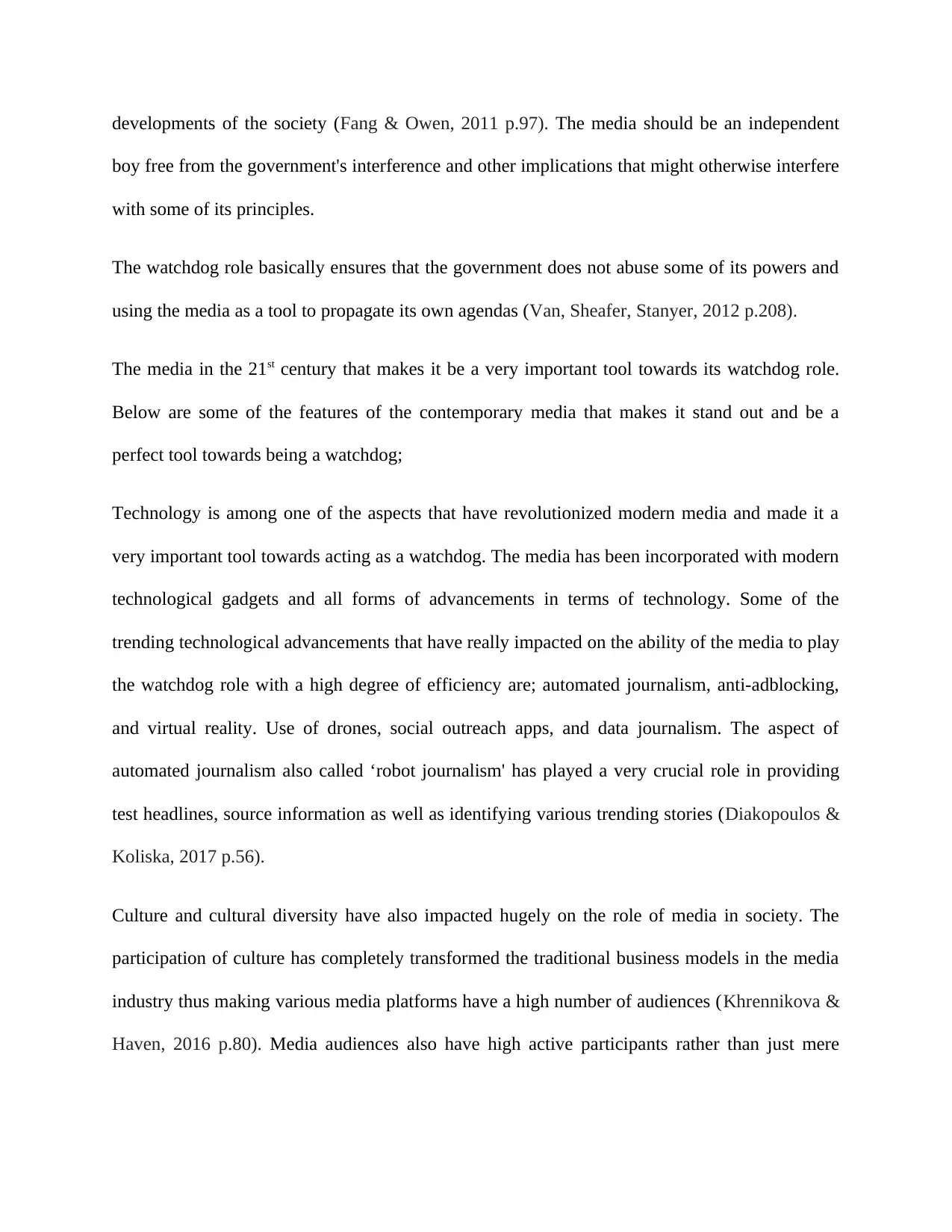
developments of the society (Fang & Owen, 2011 p.97). The media should be an independent
boy free from the government's interference and other implications that might otherwise interfere
with some of its principles.
The watchdog role basically ensures that the government does not abuse some of its powers and
using the media as a tool to propagate its own agendas (Van, Sheafer, Stanyer, 2012 p.208).
The media in the 21st century that makes it be a very important tool towards its watchdog role.
Below are some of the features of the contemporary media that makes it stand out and be a
perfect tool towards being a watchdog;
Technology is among one of the aspects that have revolutionized modern media and made it a
very important tool towards acting as a watchdog. The media has been incorporated with modern
technological gadgets and all forms of advancements in terms of technology. Some of the
trending technological advancements that have really impacted on the ability of the media to play
the watchdog role with a high degree of efficiency are; automated journalism, anti-adblocking,
and virtual reality. Use of drones, social outreach apps, and data journalism. The aspect of
automated journalism also called ‘robot journalism' has played a very crucial role in providing
test headlines, source information as well as identifying various trending stories (Diakopoulos &
Koliska, 2017 p.56).
Culture and cultural diversity have also impacted hugely on the role of media in society. The
participation of culture has completely transformed the traditional business models in the media
industry thus making various media platforms have a high number of audiences (Khrennikova &
Haven, 2016 p.80). Media audiences also have high active participants rather than just mere
boy free from the government's interference and other implications that might otherwise interfere
with some of its principles.
The watchdog role basically ensures that the government does not abuse some of its powers and
using the media as a tool to propagate its own agendas (Van, Sheafer, Stanyer, 2012 p.208).
The media in the 21st century that makes it be a very important tool towards its watchdog role.
Below are some of the features of the contemporary media that makes it stand out and be a
perfect tool towards being a watchdog;
Technology is among one of the aspects that have revolutionized modern media and made it a
very important tool towards acting as a watchdog. The media has been incorporated with modern
technological gadgets and all forms of advancements in terms of technology. Some of the
trending technological advancements that have really impacted on the ability of the media to play
the watchdog role with a high degree of efficiency are; automated journalism, anti-adblocking,
and virtual reality. Use of drones, social outreach apps, and data journalism. The aspect of
automated journalism also called ‘robot journalism' has played a very crucial role in providing
test headlines, source information as well as identifying various trending stories (Diakopoulos &
Koliska, 2017 p.56).
Culture and cultural diversity have also impacted hugely on the role of media in society. The
participation of culture has completely transformed the traditional business models in the media
industry thus making various media platforms have a high number of audiences (Khrennikova &
Haven, 2016 p.80). Media audiences also have high active participants rather than just mere
⊘ This is a preview!⊘
Do you want full access?
Subscribe today to unlock all pages.

Trusted by 1+ million students worldwide
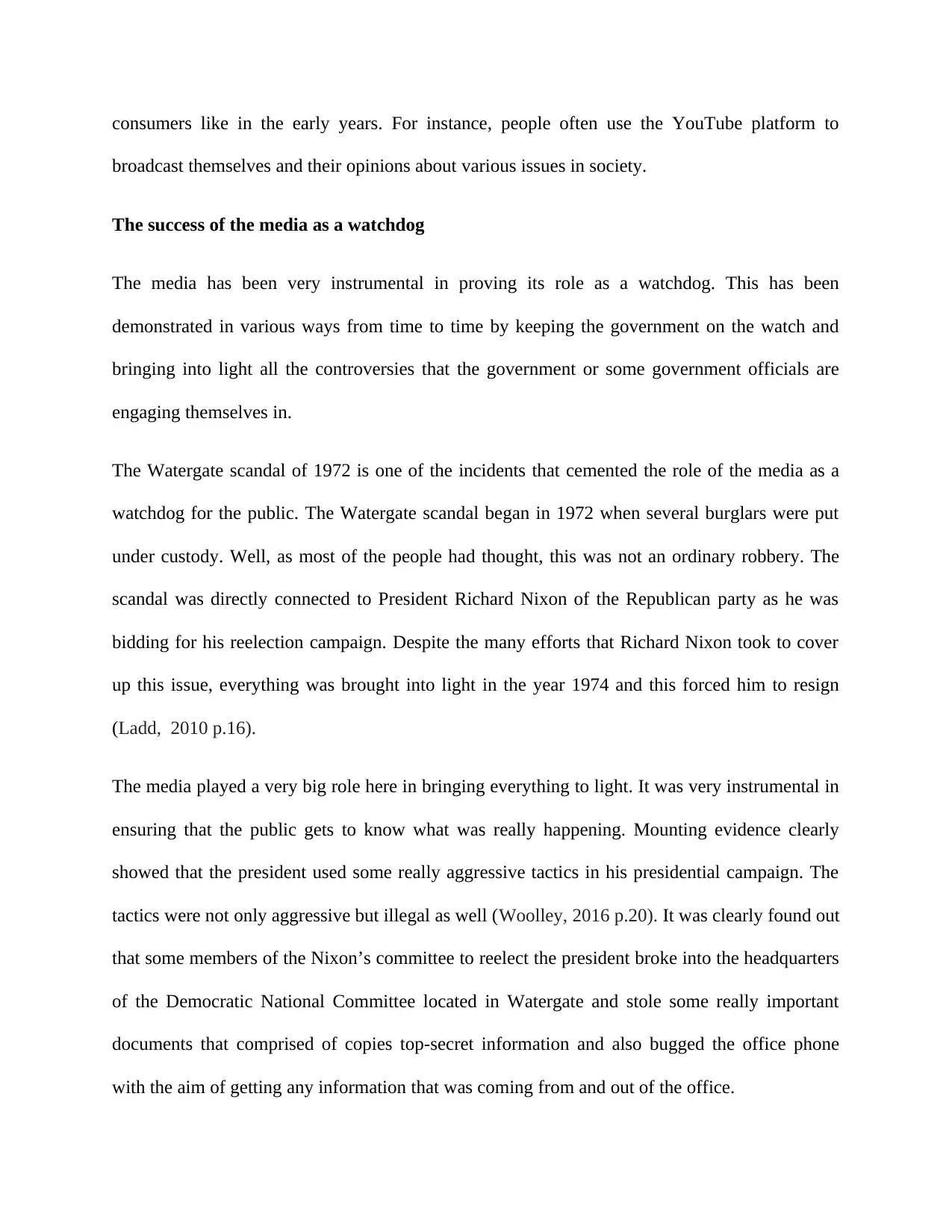
consumers like in the early years. For instance, people often use the YouTube platform to
broadcast themselves and their opinions about various issues in society.
The success of the media as a watchdog
The media has been very instrumental in proving its role as a watchdog. This has been
demonstrated in various ways from time to time by keeping the government on the watch and
bringing into light all the controversies that the government or some government officials are
engaging themselves in.
The Watergate scandal of 1972 is one of the incidents that cemented the role of the media as a
watchdog for the public. The Watergate scandal began in 1972 when several burglars were put
under custody. Well, as most of the people had thought, this was not an ordinary robbery. The
scandal was directly connected to President Richard Nixon of the Republican party as he was
bidding for his reelection campaign. Despite the many efforts that Richard Nixon took to cover
up this issue, everything was brought into light in the year 1974 and this forced him to resign
(Ladd, 2010 p.16).
The media played a very big role here in bringing everything to light. It was very instrumental in
ensuring that the public gets to know what was really happening. Mounting evidence clearly
showed that the president used some really aggressive tactics in his presidential campaign. The
tactics were not only aggressive but illegal as well (Woolley, 2016 p.20). It was clearly found out
that some members of the Nixon’s committee to reelect the president broke into the headquarters
of the Democratic National Committee located in Watergate and stole some really important
documents that comprised of copies top-secret information and also bugged the office phone
with the aim of getting any information that was coming from and out of the office.
broadcast themselves and their opinions about various issues in society.
The success of the media as a watchdog
The media has been very instrumental in proving its role as a watchdog. This has been
demonstrated in various ways from time to time by keeping the government on the watch and
bringing into light all the controversies that the government or some government officials are
engaging themselves in.
The Watergate scandal of 1972 is one of the incidents that cemented the role of the media as a
watchdog for the public. The Watergate scandal began in 1972 when several burglars were put
under custody. Well, as most of the people had thought, this was not an ordinary robbery. The
scandal was directly connected to President Richard Nixon of the Republican party as he was
bidding for his reelection campaign. Despite the many efforts that Richard Nixon took to cover
up this issue, everything was brought into light in the year 1974 and this forced him to resign
(Ladd, 2010 p.16).
The media played a very big role here in bringing everything to light. It was very instrumental in
ensuring that the public gets to know what was really happening. Mounting evidence clearly
showed that the president used some really aggressive tactics in his presidential campaign. The
tactics were not only aggressive but illegal as well (Woolley, 2016 p.20). It was clearly found out
that some members of the Nixon’s committee to reelect the president broke into the headquarters
of the Democratic National Committee located in Watergate and stole some really important
documents that comprised of copies top-secret information and also bugged the office phone
with the aim of getting any information that was coming from and out of the office.
Paraphrase This Document
Need a fresh take? Get an instant paraphrase of this document with our AI Paraphraser
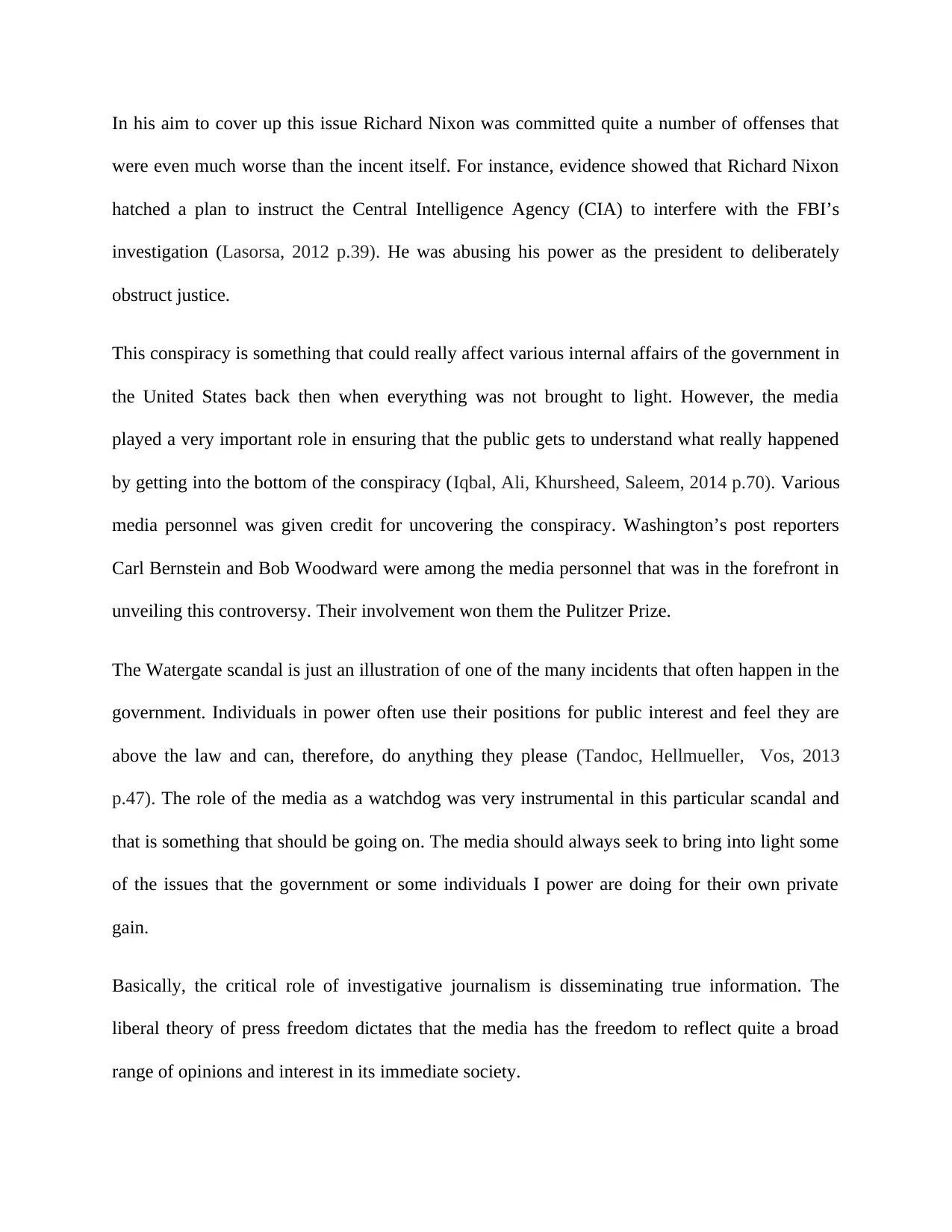
In his aim to cover up this issue Richard Nixon was committed quite a number of offenses that
were even much worse than the incent itself. For instance, evidence showed that Richard Nixon
hatched a plan to instruct the Central Intelligence Agency (CIA) to interfere with the FBI’s
investigation (Lasorsa, 2012 p.39). He was abusing his power as the president to deliberately
obstruct justice.
This conspiracy is something that could really affect various internal affairs of the government in
the United States back then when everything was not brought to light. However, the media
played a very important role in ensuring that the public gets to understand what really happened
by getting into the bottom of the conspiracy (Iqbal, Ali, Khursheed, Saleem, 2014 p.70). Various
media personnel was given credit for uncovering the conspiracy. Washington’s post reporters
Carl Bernstein and Bob Woodward were among the media personnel that was in the forefront in
unveiling this controversy. Their involvement won them the Pulitzer Prize.
The Watergate scandal is just an illustration of one of the many incidents that often happen in the
government. Individuals in power often use their positions for public interest and feel they are
above the law and can, therefore, do anything they please (Tandoc, Hellmueller, Vos, 2013
p.47). The role of the media as a watchdog was very instrumental in this particular scandal and
that is something that should be going on. The media should always seek to bring into light some
of the issues that the government or some individuals I power are doing for their own private
gain.
Basically, the critical role of investigative journalism is disseminating true information. The
liberal theory of press freedom dictates that the media has the freedom to reflect quite a broad
range of opinions and interest in its immediate society.
were even much worse than the incent itself. For instance, evidence showed that Richard Nixon
hatched a plan to instruct the Central Intelligence Agency (CIA) to interfere with the FBI’s
investigation (Lasorsa, 2012 p.39). He was abusing his power as the president to deliberately
obstruct justice.
This conspiracy is something that could really affect various internal affairs of the government in
the United States back then when everything was not brought to light. However, the media
played a very important role in ensuring that the public gets to understand what really happened
by getting into the bottom of the conspiracy (Iqbal, Ali, Khursheed, Saleem, 2014 p.70). Various
media personnel was given credit for uncovering the conspiracy. Washington’s post reporters
Carl Bernstein and Bob Woodward were among the media personnel that was in the forefront in
unveiling this controversy. Their involvement won them the Pulitzer Prize.
The Watergate scandal is just an illustration of one of the many incidents that often happen in the
government. Individuals in power often use their positions for public interest and feel they are
above the law and can, therefore, do anything they please (Tandoc, Hellmueller, Vos, 2013
p.47). The role of the media as a watchdog was very instrumental in this particular scandal and
that is something that should be going on. The media should always seek to bring into light some
of the issues that the government or some individuals I power are doing for their own private
gain.
Basically, the critical role of investigative journalism is disseminating true information. The
liberal theory of press freedom dictates that the media has the freedom to reflect quite a broad
range of opinions and interest in its immediate society.
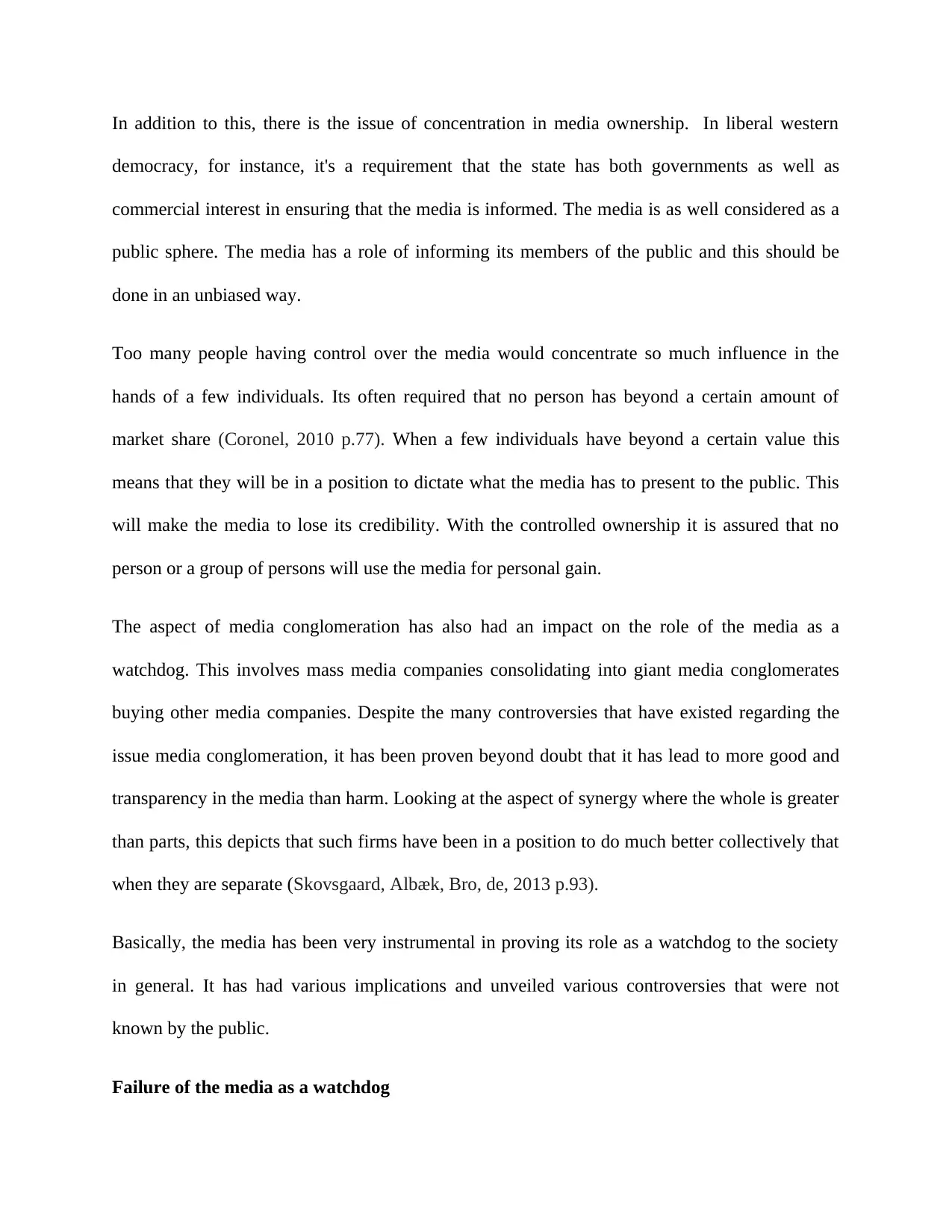
In addition to this, there is the issue of concentration in media ownership. In liberal western
democracy, for instance, it's a requirement that the state has both governments as well as
commercial interest in ensuring that the media is informed. The media is as well considered as a
public sphere. The media has a role of informing its members of the public and this should be
done in an unbiased way.
Too many people having control over the media would concentrate so much influence in the
hands of a few individuals. Its often required that no person has beyond a certain amount of
market share (Coronel, 2010 p.77). When a few individuals have beyond a certain value this
means that they will be in a position to dictate what the media has to present to the public. This
will make the media to lose its credibility. With the controlled ownership it is assured that no
person or a group of persons will use the media for personal gain.
The aspect of media conglomeration has also had an impact on the role of the media as a
watchdog. This involves mass media companies consolidating into giant media conglomerates
buying other media companies. Despite the many controversies that have existed regarding the
issue media conglomeration, it has been proven beyond doubt that it has lead to more good and
transparency in the media than harm. Looking at the aspect of synergy where the whole is greater
than parts, this depicts that such firms have been in a position to do much better collectively that
when they are separate (Skovsgaard, Albæk, Bro, de, 2013 p.93).
Basically, the media has been very instrumental in proving its role as a watchdog to the society
in general. It has had various implications and unveiled various controversies that were not
known by the public.
Failure of the media as a watchdog
democracy, for instance, it's a requirement that the state has both governments as well as
commercial interest in ensuring that the media is informed. The media is as well considered as a
public sphere. The media has a role of informing its members of the public and this should be
done in an unbiased way.
Too many people having control over the media would concentrate so much influence in the
hands of a few individuals. Its often required that no person has beyond a certain amount of
market share (Coronel, 2010 p.77). When a few individuals have beyond a certain value this
means that they will be in a position to dictate what the media has to present to the public. This
will make the media to lose its credibility. With the controlled ownership it is assured that no
person or a group of persons will use the media for personal gain.
The aspect of media conglomeration has also had an impact on the role of the media as a
watchdog. This involves mass media companies consolidating into giant media conglomerates
buying other media companies. Despite the many controversies that have existed regarding the
issue media conglomeration, it has been proven beyond doubt that it has lead to more good and
transparency in the media than harm. Looking at the aspect of synergy where the whole is greater
than parts, this depicts that such firms have been in a position to do much better collectively that
when they are separate (Skovsgaard, Albæk, Bro, de, 2013 p.93).
Basically, the media has been very instrumental in proving its role as a watchdog to the society
in general. It has had various implications and unveiled various controversies that were not
known by the public.
Failure of the media as a watchdog
⊘ This is a preview!⊘
Do you want full access?
Subscribe today to unlock all pages.

Trusted by 1+ million students worldwide
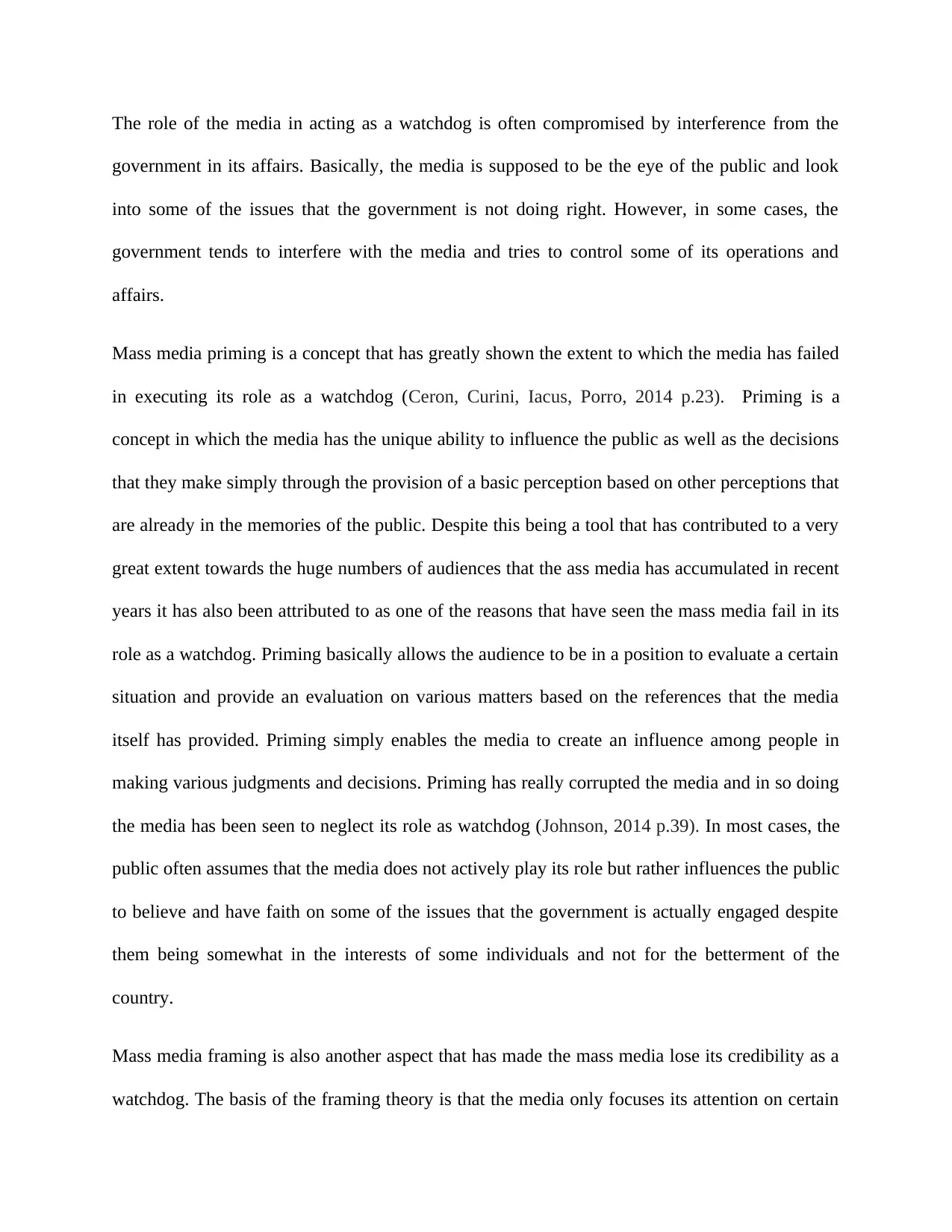
The role of the media in acting as a watchdog is often compromised by interference from the
government in its affairs. Basically, the media is supposed to be the eye of the public and look
into some of the issues that the government is not doing right. However, in some cases, the
government tends to interfere with the media and tries to control some of its operations and
affairs.
Mass media priming is a concept that has greatly shown the extent to which the media has failed
in executing its role as a watchdog (Ceron, Curini, Iacus, Porro, 2014 p.23). Priming is a
concept in which the media has the unique ability to influence the public as well as the decisions
that they make simply through the provision of a basic perception based on other perceptions that
are already in the memories of the public. Despite this being a tool that has contributed to a very
great extent towards the huge numbers of audiences that the ass media has accumulated in recent
years it has also been attributed to as one of the reasons that have seen the mass media fail in its
role as a watchdog. Priming basically allows the audience to be in a position to evaluate a certain
situation and provide an evaluation on various matters based on the references that the media
itself has provided. Priming simply enables the media to create an influence among people in
making various judgments and decisions. Priming has really corrupted the media and in so doing
the media has been seen to neglect its role as watchdog (Johnson, 2014 p.39). In most cases, the
public often assumes that the media does not actively play its role but rather influences the public
to believe and have faith on some of the issues that the government is actually engaged despite
them being somewhat in the interests of some individuals and not for the betterment of the
country.
Mass media framing is also another aspect that has made the mass media lose its credibility as a
watchdog. The basis of the framing theory is that the media only focuses its attention on certain
government in its affairs. Basically, the media is supposed to be the eye of the public and look
into some of the issues that the government is not doing right. However, in some cases, the
government tends to interfere with the media and tries to control some of its operations and
affairs.
Mass media priming is a concept that has greatly shown the extent to which the media has failed
in executing its role as a watchdog (Ceron, Curini, Iacus, Porro, 2014 p.23). Priming is a
concept in which the media has the unique ability to influence the public as well as the decisions
that they make simply through the provision of a basic perception based on other perceptions that
are already in the memories of the public. Despite this being a tool that has contributed to a very
great extent towards the huge numbers of audiences that the ass media has accumulated in recent
years it has also been attributed to as one of the reasons that have seen the mass media fail in its
role as a watchdog. Priming basically allows the audience to be in a position to evaluate a certain
situation and provide an evaluation on various matters based on the references that the media
itself has provided. Priming simply enables the media to create an influence among people in
making various judgments and decisions. Priming has really corrupted the media and in so doing
the media has been seen to neglect its role as watchdog (Johnson, 2014 p.39). In most cases, the
public often assumes that the media does not actively play its role but rather influences the public
to believe and have faith on some of the issues that the government is actually engaged despite
them being somewhat in the interests of some individuals and not for the betterment of the
country.
Mass media framing is also another aspect that has made the mass media lose its credibility as a
watchdog. The basis of the framing theory is that the media only focuses its attention on certain
Paraphrase This Document
Need a fresh take? Get an instant paraphrase of this document with our AI Paraphraser
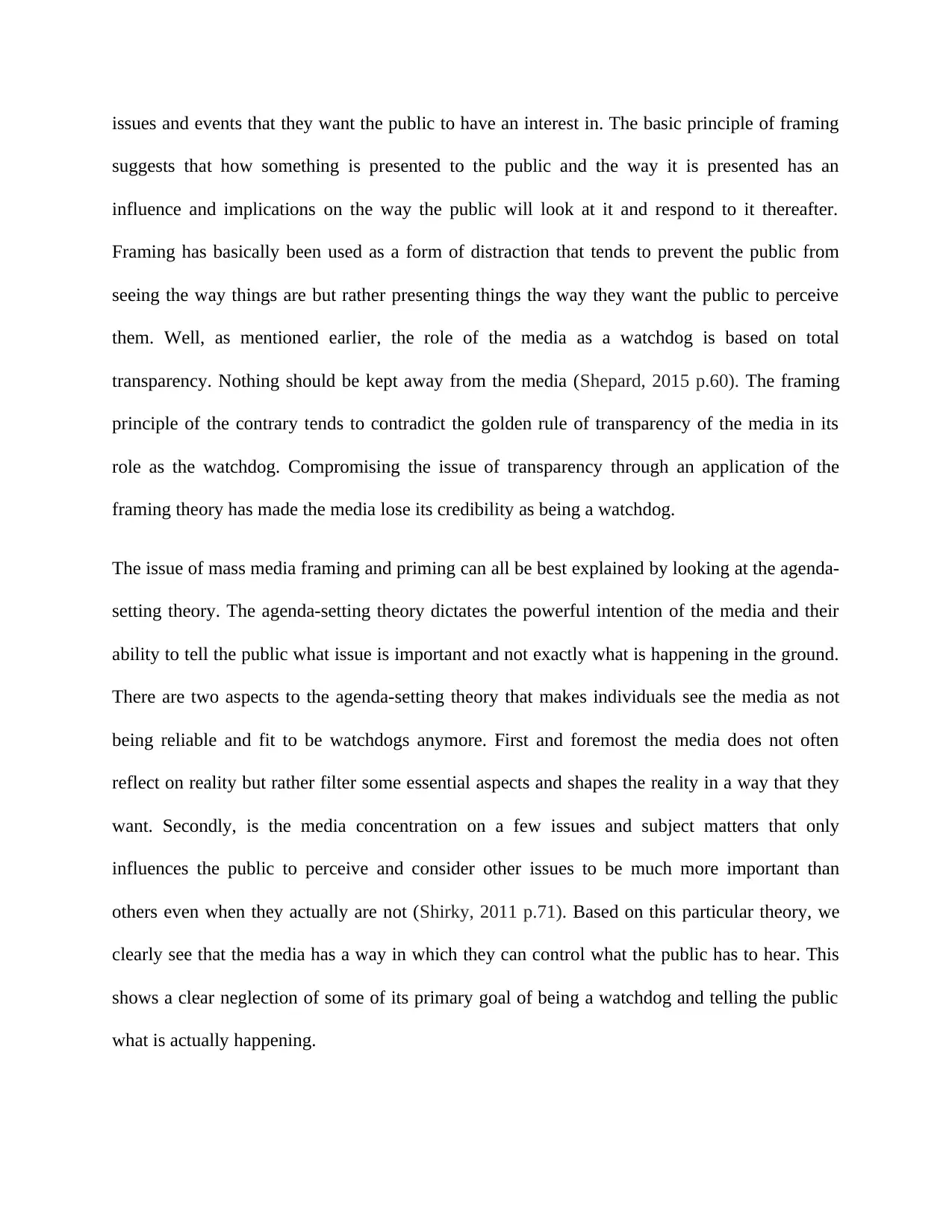
issues and events that they want the public to have an interest in. The basic principle of framing
suggests that how something is presented to the public and the way it is presented has an
influence and implications on the way the public will look at it and respond to it thereafter.
Framing has basically been used as a form of distraction that tends to prevent the public from
seeing the way things are but rather presenting things the way they want the public to perceive
them. Well, as mentioned earlier, the role of the media as a watchdog is based on total
transparency. Nothing should be kept away from the media (Shepard, 2015 p.60). The framing
principle of the contrary tends to contradict the golden rule of transparency of the media in its
role as the watchdog. Compromising the issue of transparency through an application of the
framing theory has made the media lose its credibility as being a watchdog.
The issue of mass media framing and priming can all be best explained by looking at the agenda-
setting theory. The agenda-setting theory dictates the powerful intention of the media and their
ability to tell the public what issue is important and not exactly what is happening in the ground.
There are two aspects to the agenda-setting theory that makes individuals see the media as not
being reliable and fit to be watchdogs anymore. First and foremost the media does not often
reflect on reality but rather filter some essential aspects and shapes the reality in a way that they
want. Secondly, is the media concentration on a few issues and subject matters that only
influences the public to perceive and consider other issues to be much more important than
others even when they actually are not (Shirky, 2011 p.71). Based on this particular theory, we
clearly see that the media has a way in which they can control what the public has to hear. This
shows a clear neglection of some of its primary goal of being a watchdog and telling the public
what is actually happening.
suggests that how something is presented to the public and the way it is presented has an
influence and implications on the way the public will look at it and respond to it thereafter.
Framing has basically been used as a form of distraction that tends to prevent the public from
seeing the way things are but rather presenting things the way they want the public to perceive
them. Well, as mentioned earlier, the role of the media as a watchdog is based on total
transparency. Nothing should be kept away from the media (Shepard, 2015 p.60). The framing
principle of the contrary tends to contradict the golden rule of transparency of the media in its
role as the watchdog. Compromising the issue of transparency through an application of the
framing theory has made the media lose its credibility as being a watchdog.
The issue of mass media framing and priming can all be best explained by looking at the agenda-
setting theory. The agenda-setting theory dictates the powerful intention of the media and their
ability to tell the public what issue is important and not exactly what is happening in the ground.
There are two aspects to the agenda-setting theory that makes individuals see the media as not
being reliable and fit to be watchdogs anymore. First and foremost the media does not often
reflect on reality but rather filter some essential aspects and shapes the reality in a way that they
want. Secondly, is the media concentration on a few issues and subject matters that only
influences the public to perceive and consider other issues to be much more important than
others even when they actually are not (Shirky, 2011 p.71). Based on this particular theory, we
clearly see that the media has a way in which they can control what the public has to hear. This
shows a clear neglection of some of its primary goal of being a watchdog and telling the public
what is actually happening.
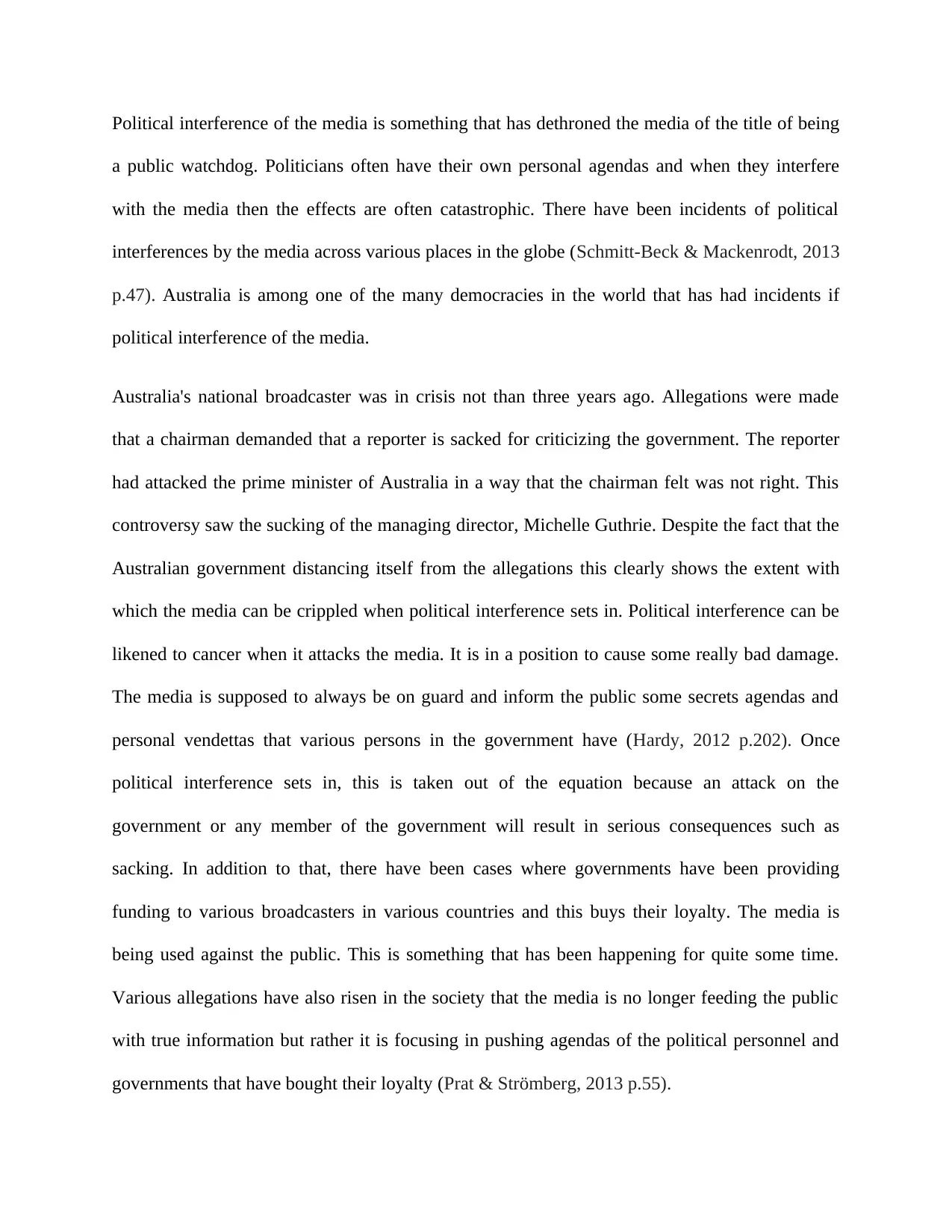
Political interference of the media is something that has dethroned the media of the title of being
a public watchdog. Politicians often have their own personal agendas and when they interfere
with the media then the effects are often catastrophic. There have been incidents of political
interferences by the media across various places in the globe (Schmitt-Beck & Mackenrodt, 2013
p.47). Australia is among one of the many democracies in the world that has had incidents if
political interference of the media.
Australia's national broadcaster was in crisis not than three years ago. Allegations were made
that a chairman demanded that a reporter is sacked for criticizing the government. The reporter
had attacked the prime minister of Australia in a way that the chairman felt was not right. This
controversy saw the sucking of the managing director, Michelle Guthrie. Despite the fact that the
Australian government distancing itself from the allegations this clearly shows the extent with
which the media can be crippled when political interference sets in. Political interference can be
likened to cancer when it attacks the media. It is in a position to cause some really bad damage.
The media is supposed to always be on guard and inform the public some secrets agendas and
personal vendettas that various persons in the government have (Hardy, 2012 p.202). Once
political interference sets in, this is taken out of the equation because an attack on the
government or any member of the government will result in serious consequences such as
sacking. In addition to that, there have been cases where governments have been providing
funding to various broadcasters in various countries and this buys their loyalty. The media is
being used against the public. This is something that has been happening for quite some time.
Various allegations have also risen in the society that the media is no longer feeding the public
with true information but rather it is focusing in pushing agendas of the political personnel and
governments that have bought their loyalty (Prat & Strömberg, 2013 p.55).
a public watchdog. Politicians often have their own personal agendas and when they interfere
with the media then the effects are often catastrophic. There have been incidents of political
interferences by the media across various places in the globe (Schmitt-Beck & Mackenrodt, 2013
p.47). Australia is among one of the many democracies in the world that has had incidents if
political interference of the media.
Australia's national broadcaster was in crisis not than three years ago. Allegations were made
that a chairman demanded that a reporter is sacked for criticizing the government. The reporter
had attacked the prime minister of Australia in a way that the chairman felt was not right. This
controversy saw the sucking of the managing director, Michelle Guthrie. Despite the fact that the
Australian government distancing itself from the allegations this clearly shows the extent with
which the media can be crippled when political interference sets in. Political interference can be
likened to cancer when it attacks the media. It is in a position to cause some really bad damage.
The media is supposed to always be on guard and inform the public some secrets agendas and
personal vendettas that various persons in the government have (Hardy, 2012 p.202). Once
political interference sets in, this is taken out of the equation because an attack on the
government or any member of the government will result in serious consequences such as
sacking. In addition to that, there have been cases where governments have been providing
funding to various broadcasters in various countries and this buys their loyalty. The media is
being used against the public. This is something that has been happening for quite some time.
Various allegations have also risen in the society that the media is no longer feeding the public
with true information but rather it is focusing in pushing agendas of the political personnel and
governments that have bought their loyalty (Prat & Strömberg, 2013 p.55).
⊘ This is a preview!⊘
Do you want full access?
Subscribe today to unlock all pages.

Trusted by 1+ million students worldwide
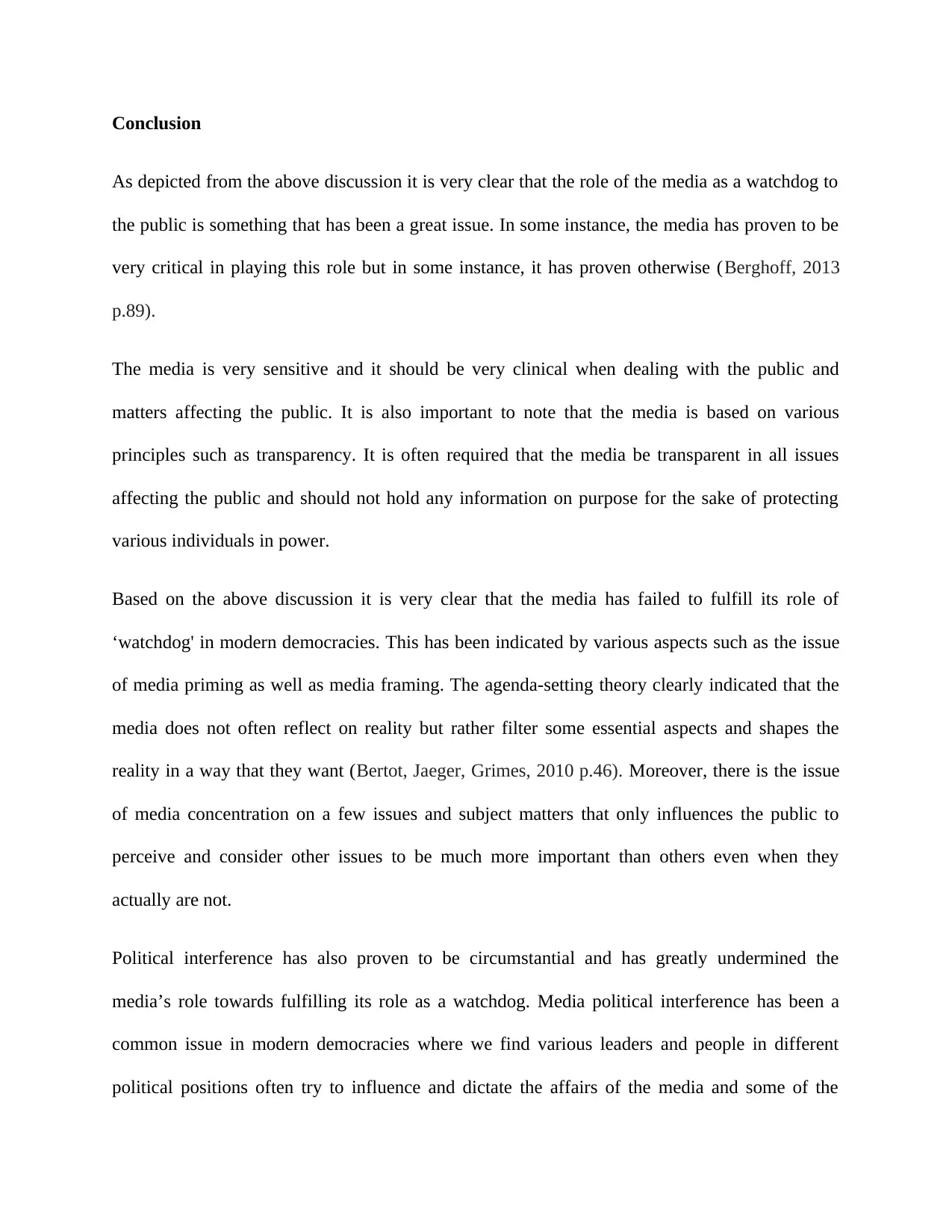
Conclusion
As depicted from the above discussion it is very clear that the role of the media as a watchdog to
the public is something that has been a great issue. In some instance, the media has proven to be
very critical in playing this role but in some instance, it has proven otherwise (Berghoff, 2013
p.89).
The media is very sensitive and it should be very clinical when dealing with the public and
matters affecting the public. It is also important to note that the media is based on various
principles such as transparency. It is often required that the media be transparent in all issues
affecting the public and should not hold any information on purpose for the sake of protecting
various individuals in power.
Based on the above discussion it is very clear that the media has failed to fulfill its role of
‘watchdog' in modern democracies. This has been indicated by various aspects such as the issue
of media priming as well as media framing. The agenda-setting theory clearly indicated that the
media does not often reflect on reality but rather filter some essential aspects and shapes the
reality in a way that they want (Bertot, Jaeger, Grimes, 2010 p.46). Moreover, there is the issue
of media concentration on a few issues and subject matters that only influences the public to
perceive and consider other issues to be much more important than others even when they
actually are not.
Political interference has also proven to be circumstantial and has greatly undermined the
media’s role towards fulfilling its role as a watchdog. Media political interference has been a
common issue in modern democracies where we find various leaders and people in different
political positions often try to influence and dictate the affairs of the media and some of the
As depicted from the above discussion it is very clear that the role of the media as a watchdog to
the public is something that has been a great issue. In some instance, the media has proven to be
very critical in playing this role but in some instance, it has proven otherwise (Berghoff, 2013
p.89).
The media is very sensitive and it should be very clinical when dealing with the public and
matters affecting the public. It is also important to note that the media is based on various
principles such as transparency. It is often required that the media be transparent in all issues
affecting the public and should not hold any information on purpose for the sake of protecting
various individuals in power.
Based on the above discussion it is very clear that the media has failed to fulfill its role of
‘watchdog' in modern democracies. This has been indicated by various aspects such as the issue
of media priming as well as media framing. The agenda-setting theory clearly indicated that the
media does not often reflect on reality but rather filter some essential aspects and shapes the
reality in a way that they want (Bertot, Jaeger, Grimes, 2010 p.46). Moreover, there is the issue
of media concentration on a few issues and subject matters that only influences the public to
perceive and consider other issues to be much more important than others even when they
actually are not.
Political interference has also proven to be circumstantial and has greatly undermined the
media’s role towards fulfilling its role as a watchdog. Media political interference has been a
common issue in modern democracies where we find various leaders and people in different
political positions often try to influence and dictate the affairs of the media and some of the
Paraphrase This Document
Need a fresh take? Get an instant paraphrase of this document with our AI Paraphraser
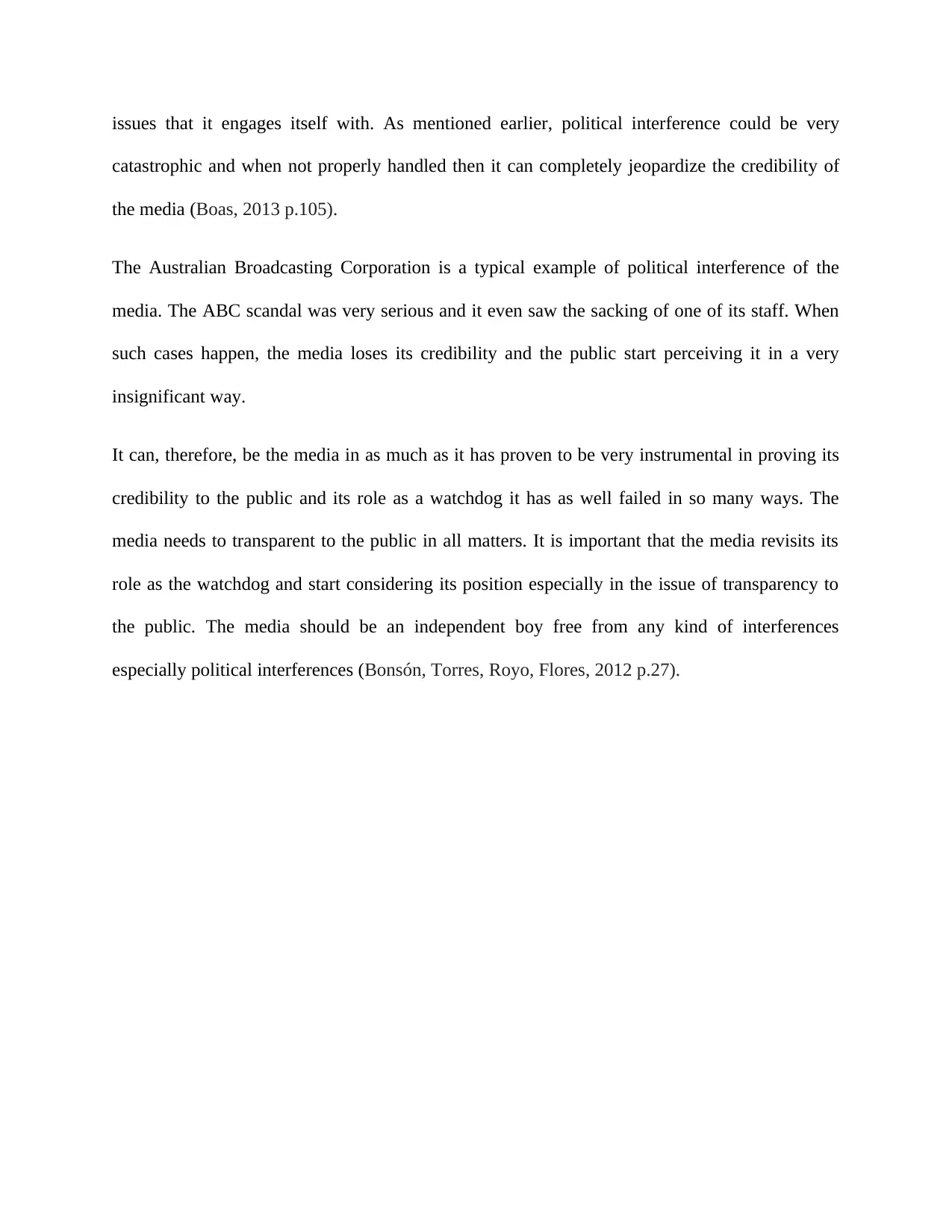
issues that it engages itself with. As mentioned earlier, political interference could be very
catastrophic and when not properly handled then it can completely jeopardize the credibility of
the media (Boas, 2013 p.105).
The Australian Broadcasting Corporation is a typical example of political interference of the
media. The ABC scandal was very serious and it even saw the sacking of one of its staff. When
such cases happen, the media loses its credibility and the public start perceiving it in a very
insignificant way.
It can, therefore, be the media in as much as it has proven to be very instrumental in proving its
credibility to the public and its role as a watchdog it has as well failed in so many ways. The
media needs to transparent to the public in all matters. It is important that the media revisits its
role as the watchdog and start considering its position especially in the issue of transparency to
the public. The media should be an independent boy free from any kind of interferences
especially political interferences (Bonsón, Torres, Royo, Flores, 2012 p.27).
catastrophic and when not properly handled then it can completely jeopardize the credibility of
the media (Boas, 2013 p.105).
The Australian Broadcasting Corporation is a typical example of political interference of the
media. The ABC scandal was very serious and it even saw the sacking of one of its staff. When
such cases happen, the media loses its credibility and the public start perceiving it in a very
insignificant way.
It can, therefore, be the media in as much as it has proven to be very instrumental in proving its
credibility to the public and its role as a watchdog it has as well failed in so many ways. The
media needs to transparent to the public in all matters. It is important that the media revisits its
role as the watchdog and start considering its position especially in the issue of transparency to
the public. The media should be an independent boy free from any kind of interferences
especially political interferences (Bonsón, Torres, Royo, Flores, 2012 p.27).
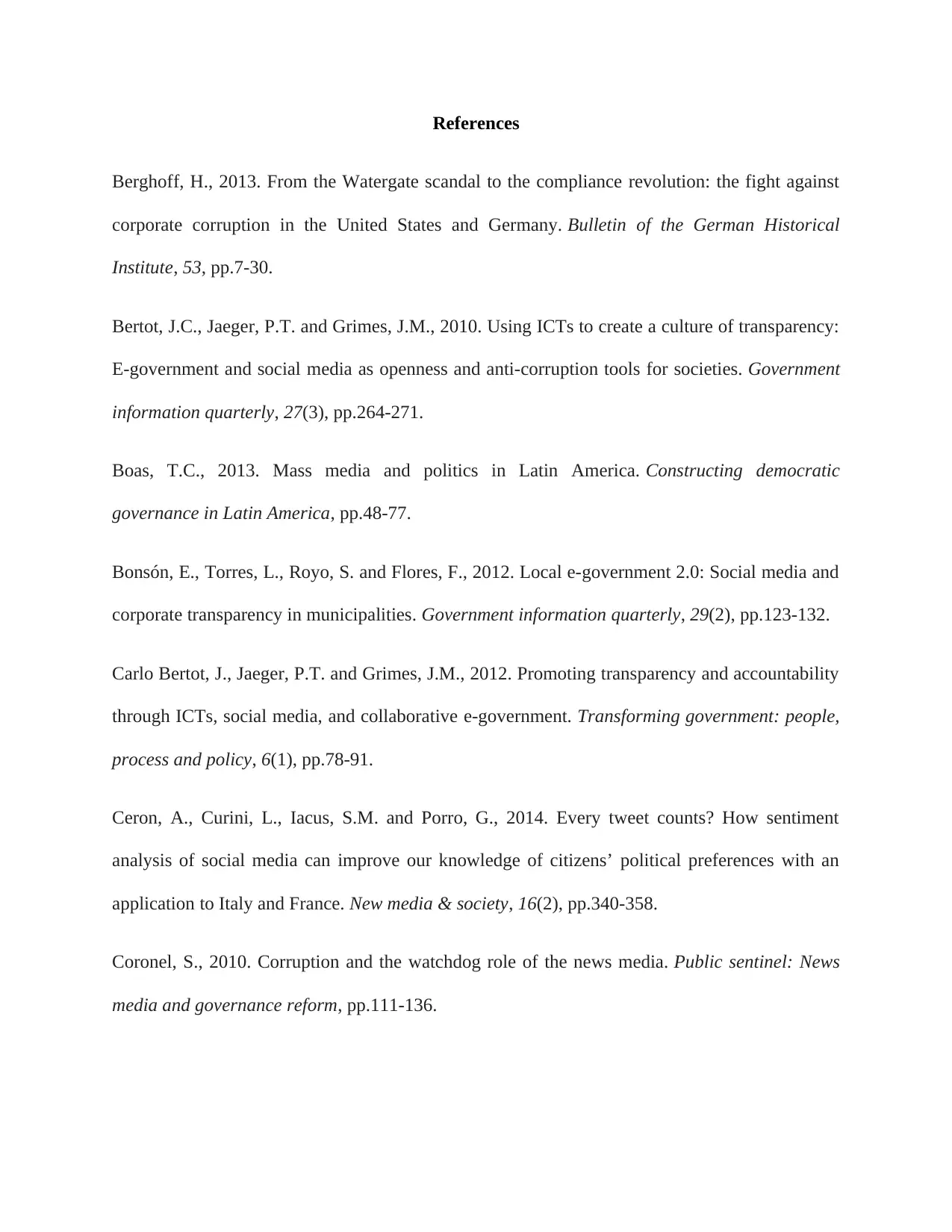
References
Berghoff, H., 2013. From the Watergate scandal to the compliance revolution: the fight against
corporate corruption in the United States and Germany. Bulletin of the German Historical
Institute, 53, pp.7-30.
Bertot, J.C., Jaeger, P.T. and Grimes, J.M., 2010. Using ICTs to create a culture of transparency:
E-government and social media as openness and anti-corruption tools for societies. Government
information quarterly, 27(3), pp.264-271.
Boas, T.C., 2013. Mass media and politics in Latin America. Constructing democratic
governance in Latin America, pp.48-77.
Bonsón, E., Torres, L., Royo, S. and Flores, F., 2012. Local e-government 2.0: Social media and
corporate transparency in municipalities. Government information quarterly, 29(2), pp.123-132.
Carlo Bertot, J., Jaeger, P.T. and Grimes, J.M., 2012. Promoting transparency and accountability
through ICTs, social media, and collaborative e-government. Transforming government: people,
process and policy, 6(1), pp.78-91.
Ceron, A., Curini, L., Iacus, S.M. and Porro, G., 2014. Every tweet counts? How sentiment
analysis of social media can improve our knowledge of citizens’ political preferences with an
application to Italy and France. New media & society, 16(2), pp.340-358.
Coronel, S., 2010. Corruption and the watchdog role of the news media. Public sentinel: News
media and governance reform, pp.111-136.
Berghoff, H., 2013. From the Watergate scandal to the compliance revolution: the fight against
corporate corruption in the United States and Germany. Bulletin of the German Historical
Institute, 53, pp.7-30.
Bertot, J.C., Jaeger, P.T. and Grimes, J.M., 2010. Using ICTs to create a culture of transparency:
E-government and social media as openness and anti-corruption tools for societies. Government
information quarterly, 27(3), pp.264-271.
Boas, T.C., 2013. Mass media and politics in Latin America. Constructing democratic
governance in Latin America, pp.48-77.
Bonsón, E., Torres, L., Royo, S. and Flores, F., 2012. Local e-government 2.0: Social media and
corporate transparency in municipalities. Government information quarterly, 29(2), pp.123-132.
Carlo Bertot, J., Jaeger, P.T. and Grimes, J.M., 2012. Promoting transparency and accountability
through ICTs, social media, and collaborative e-government. Transforming government: people,
process and policy, 6(1), pp.78-91.
Ceron, A., Curini, L., Iacus, S.M. and Porro, G., 2014. Every tweet counts? How sentiment
analysis of social media can improve our knowledge of citizens’ political preferences with an
application to Italy and France. New media & society, 16(2), pp.340-358.
Coronel, S., 2010. Corruption and the watchdog role of the news media. Public sentinel: News
media and governance reform, pp.111-136.
⊘ This is a preview!⊘
Do you want full access?
Subscribe today to unlock all pages.

Trusted by 1+ million students worldwide
1 out of 14
Related Documents
Your All-in-One AI-Powered Toolkit for Academic Success.
+13062052269
info@desklib.com
Available 24*7 on WhatsApp / Email
![[object Object]](/_next/static/media/star-bottom.7253800d.svg)
Unlock your academic potential
Copyright © 2020–2025 A2Z Services. All Rights Reserved. Developed and managed by ZUCOL.





